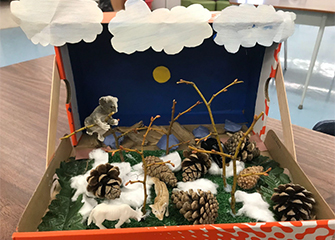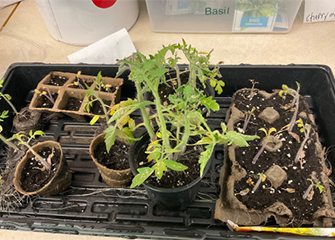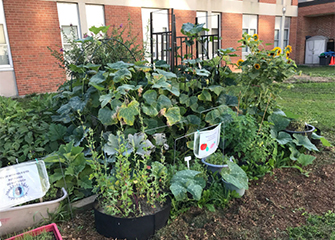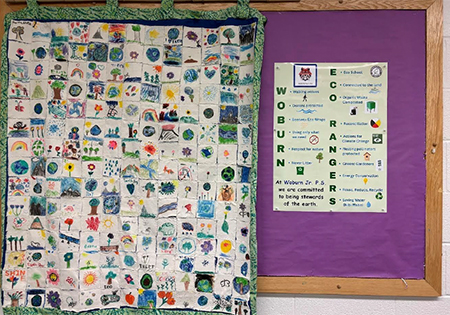Woburn Junior Public School has been a Platinum Eco School since 2022, as a result of their many school-wide initiatives and ongoing focus on changing behaviours and mindsets. Here are some examples of their creative and impactful initiatives:

Repurposing and Innovative Recycling - the goal of this initiative is to recycle, repurpose, or repair items that are not recyclable through the regular recycling stream, and help to divert waste from landfills.
- At Halloween, students used scrap fabric from a factory to create mummies.
- Grade 2/3 students created arcade games using a variety of repurposed and recyclable materials.
- Grade 6 students created animal dioramas for their Nature unit in French class using a variety of repurposed and recyclable materials.
- The school is saving clam shell containers from the snack program to collect and package greens from the school garden.
Finding a second life for products reduces our reliance on new materials and the energy required for extraction, fabrication, and transportation. Much of the energy used in manufacturing is generated from fossil fuels, and when we can extend the life of products, we reduce the greenhouse gases that would be emitted from the making of new products.

Growing a Food Garden - Since 2022, Woburn Junior Public School has been participating in growing food for the Community Garden at nearby Woburn Collegiate Institute, in partnership with the Woburn Local Residents Table. For the past three years, Woburn JPS classes have been involved in planting seedlings, transplanting plants, and harvesting a variety of food, including peppers, tomatoes, lettuce and garlic.
The Food Garden is a wonderful opportunity for students to get their hands dirty, grow food for the community, and learn about plants, ecosystems and nutrition. Each fall, students harvest the food that they planted in the spring and share it with other students and the community.

The school also brings gardening indoors with its seven tower gardens and two mobile vegepods. These activities allow students to participate in year-round learning about gardening and plants. Students in Grade 5 enjoyed a salad lunch using the greens from the tower gardens. They also learned how to make a salad dressing and took it home in a reusable mason jar!
According to the David Suzuki Foundation, the average meal travels 1,200 kilometres from the farm to plate. Food grown locally produces fewer transportation emissions. Fresh food grown at school also doesn’t require additional energy required for processing and refrigeration.
Building the School’s Eco Quilt - To develop Woburn Junior Public School’s EcoCode for the 2023-24 school year, students and staff built an Eco Quilt using fabric scraps from a garment factory. An EcoCode is a school’s environmental policy or mission statement that demonstrates its commitment to climate action. Students had the opportunity to draw or write something about the Earth as part of the quilt. This year, the school’s Eco Club created a school-wide mission statement to commit to taking care of the planet and their community. They created an acrostic representation and added that mission statement to the quilt.
Fundamental to embracing sustainability as a community practice is knowing that we do not exist in isolation. When students take time to reflect on their place in the world, and pledge to act in life-affirming ways, they increase their capacity to live sustainably. Recent studies show that climate change education can be an effective climate change mitigation strategy, including resulting in reduced carbon emissions on par with rooftop solar integration.
